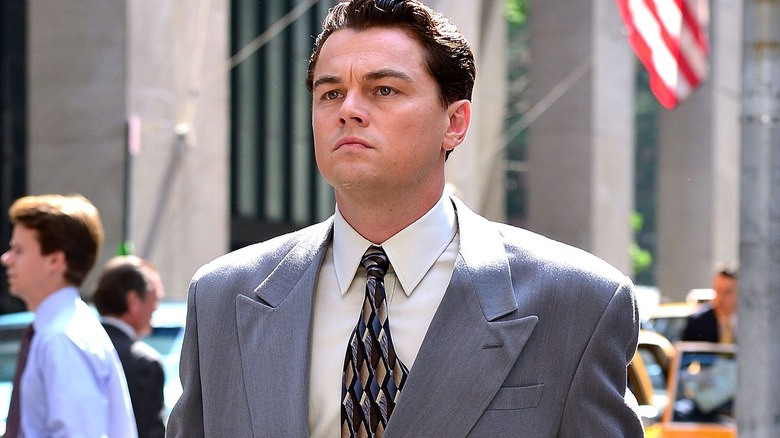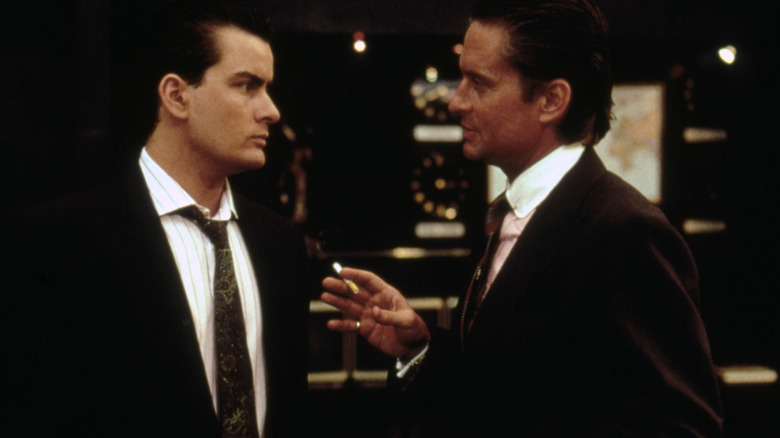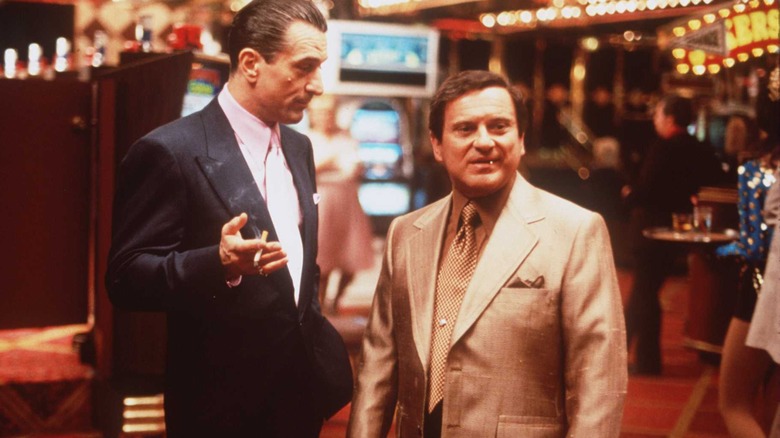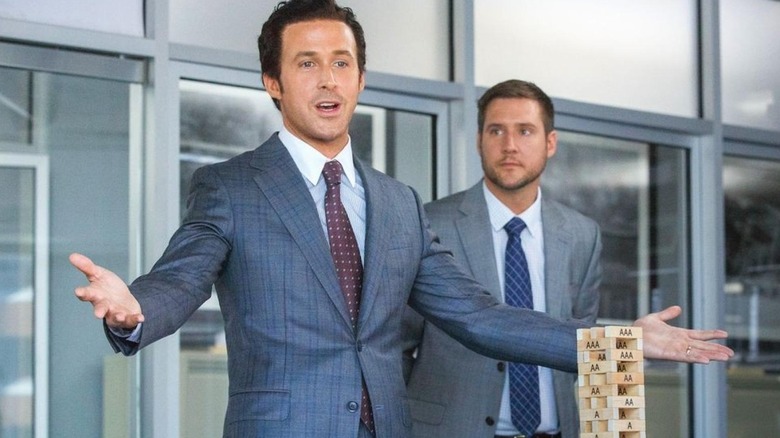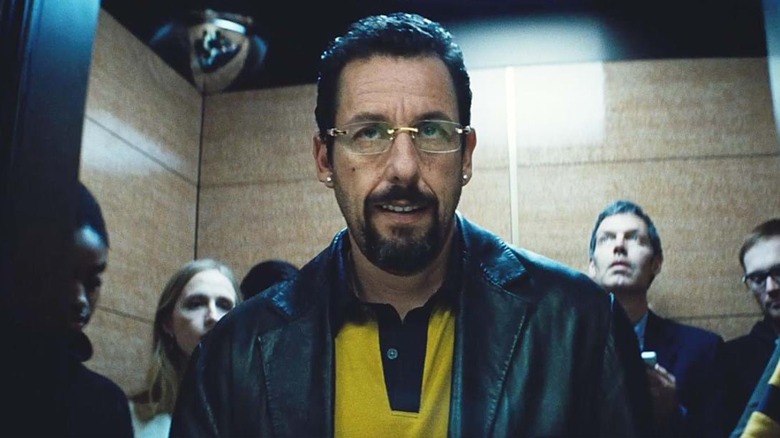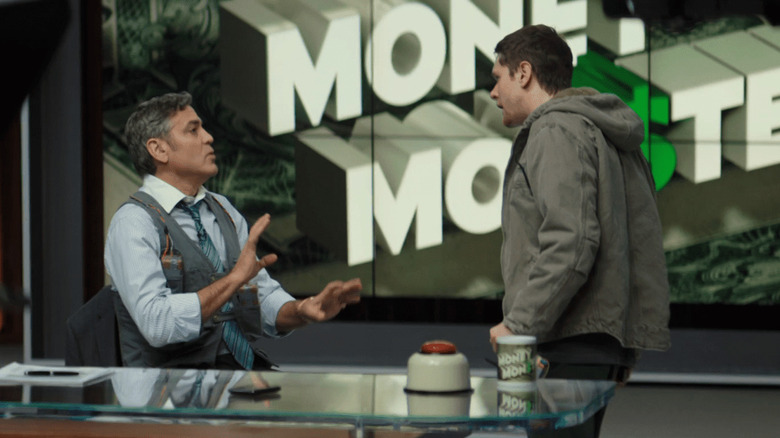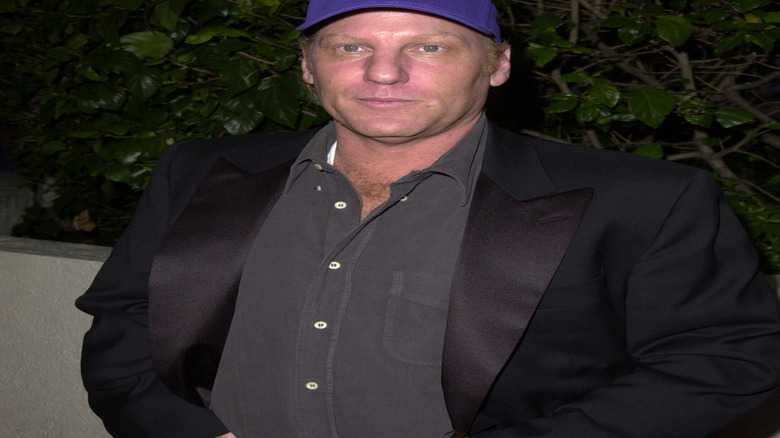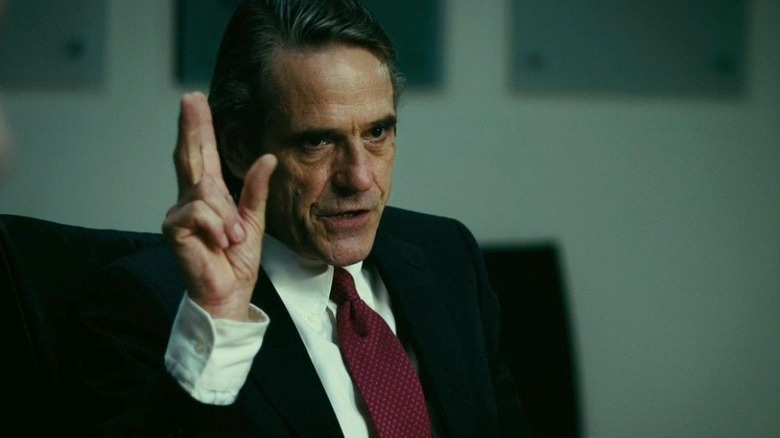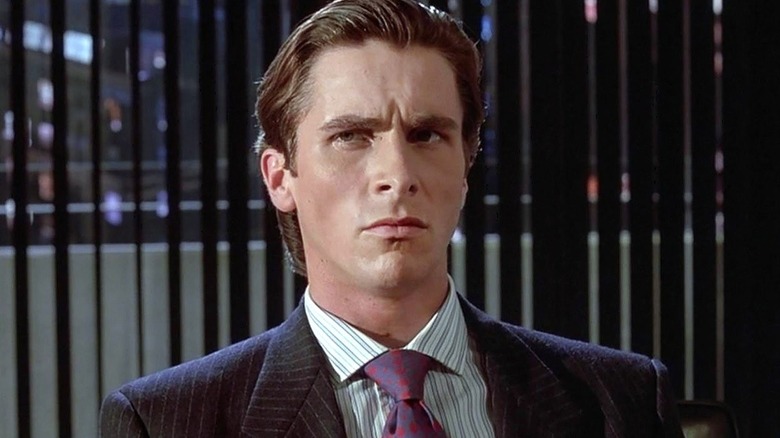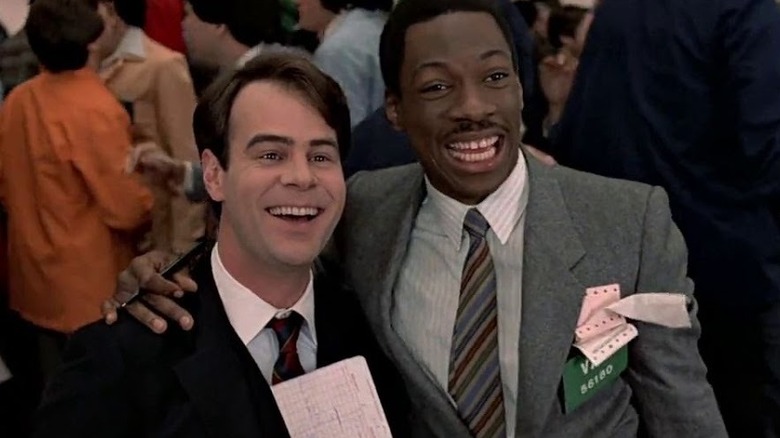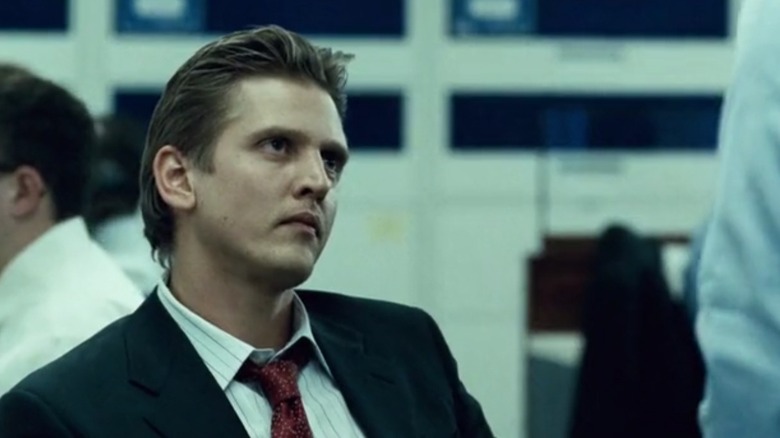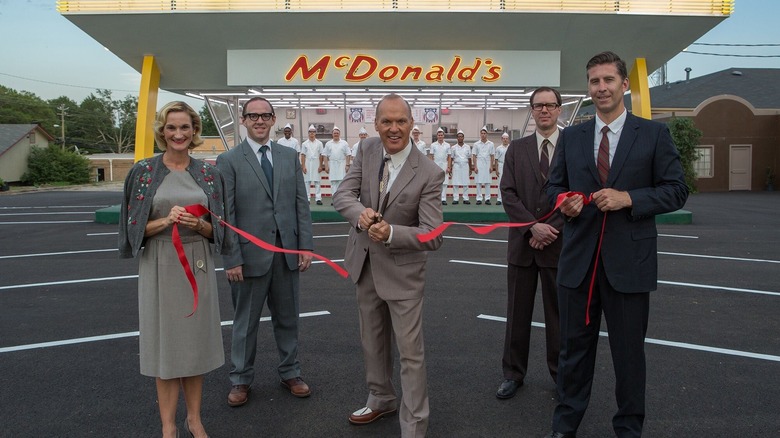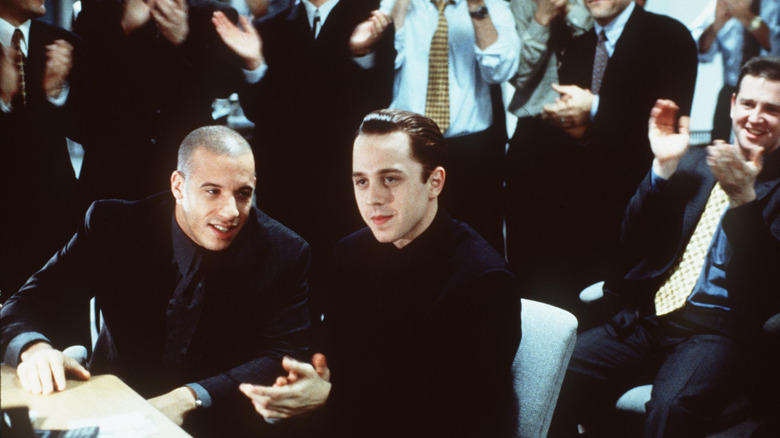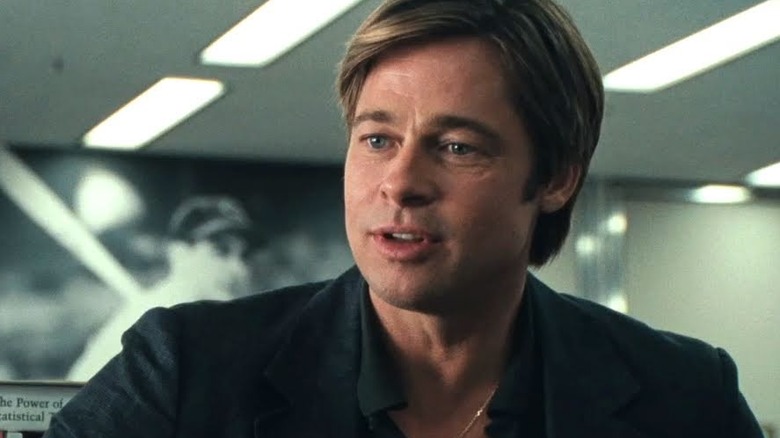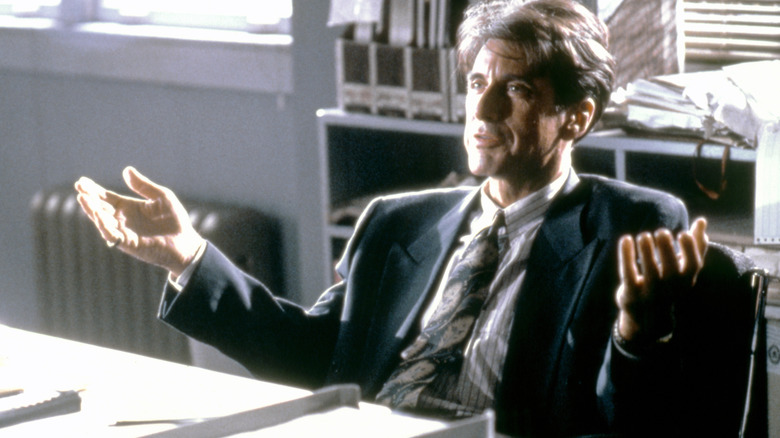Director Martin Scorsese’s “The Wolf of Wall Street” tells the tale of the rise and fall of Jordan Belfort, who got rich and then got jail time by playing fast and loose with the stock market. Leonardo DiCaprio plays Belfort, nabbing his third best actor Oscar nomination alongside Scorsese’s seventh nomination for best director. And on top of all the accolades, the very R-rated “The Wolf of Wall Street” also scored big at the box office, becoming one of the most successful controversial movies of all time.
When considering other movies to watch in the same vein as “The Wolf of Wall Street,” the most obvious line to draw is other movies about the stock market. And there are certainly a few of those to be found here — including one that inspired Jordan Belfort himself. But “The Wolf of Wall Street” is also a movie about people getting rich while actively taking money away from others, who hide bad behavior behind a charming smile, and about those who think money solves all problems and is the only measure of status that matters.
Movies that cover some, if not all, of those criteria are recommended here — along with another Martin Scorsese film, though not necessarily the one you might think.
Wall Street
Not only is 1987’s “Wall Street” the most obvious recommendation for “The Wolf of Wall Street” fans because of the shared subgenre, but Jordan Belfort has spoken about how much “Wall Street” inspired him. In particular, Belfort said he looked up to “Wall Street” protagonist Gordon Gekko (Michael Douglas), and tried to emulate Gordon’s career — apparently overlooking the fact that Gordon went to jail in the end.
But misplaced worship of Gordon Gekko aside, “Wall Street” is nonetheless essential viewing for anyone even remotely interested in the world of stock trading and corporate finance. Douglas earned his sole acting Oscar win for his portrayal of Gordon Gekko, a corporate raider who finds a willing protege in young stockbroker Bud Fox (Charlie Sheen). Bud initially enjoys the spoils of the wealth and power that Gordon teaches him to yield, but when things sour between them, it becomes a matter of loyalty versus self-preservation.
Casino
When recommending other Martin Scorsese movies after “The Wolf of Wall Street,” “Goodfellas” seems to be the most common choice. But we prefer to bet on “Casino,” Scorsese’s underrated 1995 crime drama, for the more fitting Scorsese double feature.
For one thing, “Casino” is more thematically similar in that it’s more specifically about business. Also based on a true story, it follows a Chicago gangster named Sam Rothstein (Robert De Niro) who is sent to Las Vegas to turn around a fledging casino. He does so by not exactly legal means, helped along by childhood friend Nicky Santoro (Joe Pesci) as his partner and muscle. Things go great at first, until the assignment and its mounting issues make things too difficult for Sam both professionally and personally.
In addition to being one of the best movies set in Las Vegas, “Casino” is one of Scorsese’s most underrated films, forced to live in the shadow of “Goodfellas.” But it deserves more love, and is arguably the better partner to “The Wolf of Wall Street.”
The Big Short
The 2008 financial crisis has been the subject of multiple films, TV shows, documentaries, books, and more. And most of them aren’t what one would call “entertaining,” which seems fair given that it wasn’t exactly a cheery situation. But 2015’s “The Big Short,” directed and co-written by Adam McKay, manages to inject some comedic elements to make the movie both watchable and understandable to a mainstream audience while not pulling any punches on the severity of the effects of the crisis.
Collecting a ridiculously stacked cast that includes Christian Bale, Steve Carell, Ryan Gosling, Melissa Leo, and Brad Pitt, McKay brought together three of the biggest events that occurred in the years in the lead up to 2008. We see smiling men in suits selling their products and ideas, some intentionally playing the role of snake oil salesman while others do so almost unwittingly. And we see the people who saw the cracks before anyone else, and whose warnings went almost entirely ignored, or were silenced by the powerful people who stood to profit the most from the damage they were about to unleash upon millions of Americans.
Uncut Gems
Despite earning raves for dramatic performances in movies like “Punch-Drunk Love,” “Reign Over Me,” and “The Meyerowitz Stories (New & Selected),” people were still surprised when Adam Sandler turned in his powerhouse performance in “Uncut Gems.” It earned him an Independent Spirit Award and a very vocal chorus of people who believe he was unfairly snubbed for an Oscar nomination.
Beyond the career-best work and a stunt that had Sandler fighting for his life, “Uncut Gems” is a thrilling look at the same type of charm-based, high-octane, high-testosterone salesmanship that Jordan Belfort utilized to make his millions — only within the world of jewelry and precious stones. As we see with Belfort, there are moments in “Uncut Gems” where it seems like Howard Ratner (Sandler) has finally won, beaten the system, and has all the pieces in play to take a breath and enjoy the spoils. But that’s still not enough: Howard will never stop pushing for just a little more, for that one next “last” big score. He’s more addicted to the thrill of the race than actually winning it.
Money Monster
There were so many movies in the 2010s about the tanking economy that one starring George Clooney and Julia Roberts came and went with little notice. That was 2016’s “Money Monster,” which stars Clooney as the host of a fictional financial advice show who is confronted by a man (Jack O’Connell) whose life was ruined in part by listening to the show’s questionable investing tips, and takes the whole station hostage.
Critics were fairly lukewarm on “Money Monster,” particularly in terms of how it stuck the landing, but praised the performances and the script. What makes the movie worth seeking out is that, while it tells a fairly familiar story overall, it tells it from a different angle than most movies of its ilk. Especially in the way it has someone actually try and seek revenge for what was done to him, rather than just see him be sad and broke. Sure, revenge isn’t recommended in real life, especially the illegal kind, but it’s still a crowd-pleasing thing to see happen in a movie where nobody is actually getting hurt.
Maddman: The Steve Madden Story
In January 2025, it was announced that an actual documentary about Jordan Belfort and his ill-fated brokerage firm was in the works. It will be the first feature-length documentary on Belfort and the company – Stratton Oakmont — since there have only been episodes of docuseries and various YouTube videos on the subject this far. Once that hits, it’ll certainly be near the top of the list of recommendations to watch before or after “The Wolf of Wall Street.”
Until then, the closest thing there is to a documentary film in Belfort’s and Stratton Oakmont’s orbit is 2017’s “Maddman: The Steve Madden Story.” Madden is best known for the line of high-end shoes, purses, and other fashion accessories that bear his name — well, that, and the fact that he was convicted and served jail time for fraud and stock manipulation. Why is this relevant for “The Wolf of Wall Street” viewers? Because Madden’s shady business dealings were connected with Stratton Oakmont, which happened to be co-founded by one of his childhood friends. Madden was also in the movie, played by actor Jake Hoffman.
Margin Call
If you want the more fun version of the 2008 financial crisis, the one with some of Hollywood’s most charming actors, definitely watch “The Big Short.” But you should also watch the drier but still no less compelling “Margin Call.” A pretty solid double feature would be those two movies, coming at the same overall event from slightly different angles and very different vibes.
Some would argue that something that absolutely destroyed people’s lives — and in many cases, they still haven’t put the pieces back together nearly 20 years on — shouldn’t be told with a light touch. And for those people, “Margin Call” is the more appropriate film on this topic. The movie focuses on a specific investment firm and the news they received that make it obvious that the crash is coming. In fact, it’s literally coming tomorrow. So big decisions need to be made, and a struggle arises between those who think they should do what’s right for the greater good, and those that are only interested in reducing the incoming damage to their own lives and portfolios.
American Psycho
While the fact that it has one of the most controversial movie endings of all time sometimes overshadows its legacy, there’s no denying that “American Psycho” is a classic — particularly for those who think that people like Jordan Belfort are rife for mockery. Christian Bale plays Patrick Bateman, a successful investment banker who seems to have everything going for him. He also has a nasty habit of murdering people in the most brutal fashion possible and appears to feel nothing while doing so.
Dark comedies don’t get much darker than “American Psycho,” and it’s certainly not for everyone. Even people who didn’t bat an eye at “The Wolf of Wall Street”‘s record-breaking profanity or its multiple depictions of nudity might still wince at some of the things Patrick does. But where the fascinating juxtaposition occurs between the two movies is that some people mistakenly came away from “The Wolf of Wall Street” celebrating its protagonists, even while that was clearly not the point. “American Psycho” might tempt you into doing the same, at least initially, but it is much more obvious about shaming you for doing so before the movie’s even half over.
Trading Places
And now for something completely different — a truly lighthearted comedy that touches on the general themes of how the stock market and big money seem to have different rules for the already rich versus us regular folks. If nothing else, “Trading Places” offers a nice palette cleanser after a movie like “The Wolf of Wall Street,” particularly those who like their financial comedies sans axe murder.
Louis Winthorpe III (Dan Aykroyd) and Billy Ray Valentine (Eddie Murphy) are an investment firm director and a con man, respectively, whose circumstances couldn’t be in starker opposition. Which is why they are made the pawns in a bet between two rich men who put Louis and Billy Ray into something of a prince and pauper situation. Does the experiment confirm that the rich do indeed get richer while the poor stay poorer? Obviously. But it’s still a fun ride, and it’s a classic comedy for a reason — not to mention that Reddit crowned “Trading Places” as its favorite unofficial Christmas movie a few years back.
The 25th Hour
There is indeed a character in Spike Lee’s “The 25th Hour” who is a Wall Street trader — Frank, played by actor Barry Pepper — but that’s not even really why we think it’s a good watch for “The Wolf of Wall Street” fans. More to the point is main protagonist Monty (Edward Norton), who is spending his literal last day of freedom before he begins a prison sentence for being a drug dealer. The movie flashes back and forth between Monty trying to get in as much time with his friends and loved ones as he can, and the various events that led up to the day he was first busted.
It’s easy to default to feeling zero pity for Monty as he faces consequences he objectively deserves. Frank certainly seems to feel that way — though never to Monty’s face. The other people in Monty’s life, however, are a little more conflicted about the punishment he is to face and whether he not he truly has it coming from a moral standpoint. “The 25th Hour” paints a slightly greyer picture of a criminal facing his comeuppance than “The Wolf of Wall Street” does, and that’s what makes the two movies such great companion pieces.
Dumb Money
Another movie based on a true story about the complicated and imbalanced world of buying and selling stocks, the events of “Dumb Money” happened far more recently than any other film on this list. It occurs around the time of the COVID-19 pandemic in 2020, when a stock market speculation live streamer decides to go all-in on the faltering stock of video game retail chain Gamestop.
He convinces his followers to do the same, and what follows is a story that proves just how arbitrary the so-called value of stocks really are, how easy they are for powerful people to manipulate, and how quickly those same powerful people can turn the tables in their favor — and against the “little guy” — as they see fit. In the end, not everyone we rooted for comes out ahead, and not everyone we rooted against loses, but it’s still an overall inspiring story that proves that regular folks can occasionally “beat” Wall Street.
The Founder
The year is 1954. A milkshake machine salesman named Ray Kroc visits a California restaurant called McDonald’s that purchased a previously unheard of number of his machines. What Kroc finds is an operation that is built on speed and efficiency, but while still maintaining the level of service and food quality found in other burger establishments. It doesn’t take long before Kroc basically strongarms his way into being a partner in the business — and eventually, takes it over entirely, leaving the actual founders of McDonald’s with next to nothing to show for the fact that they helped to launch one of the largest fast food chains in the entire world.
A version of that story is told by “The Founder,” with Michael Keaton playing Kroc as he helps himself to an empire around a business he didn’t even start. It’s the kind of movie that leaves you feeling white hot with rage seeing someone smooth talk his way into riches while icing out the people who got him there, but it’s essential viewing for anyone even remotely interested in 20th-century businesses and entrepreneurs.
Boiler Room
Perhaps no other movie on this list besides “Wall Street” is as no-brainer of a recommendation for “The Wolf of Wall Street” fans as 2000’s “Boiler Room.” After all, Jordan Belfort has claimed that the movie is based on him and his own story. And while that has never been officially confirmed or denied by the filmmakers of “Boiler Room,” it’s not a stretch to draw that line given the similarities in the stories, and the fact that “Boiler Room” came out very shortly after Belfort’s downfall.
“Boiler Room” follows Seth (Giovanni Ribisi), who has managed to set up an impressive underground casino right out of his home. When his stock broker cousin brings one of his colleagues along to visit Seth’s casino, they are impressed by what he has accomplished and invite him to join their firm. Seth thinks this is actually his chance to put his people skills and business acumen to work in a legitimate career, but he soon finds that the firm is anything but legitimate, becoming an unwilling participant in a business endeavor that is even more illegal than his underground casino.
Moneyball
Not everyone who moves money around to solve a problem does so from a place of greed, or is out to screw over everyone. Which brings us to “Moneyball,” based on the man who helped the struggling Oakland A’s rebound in their 2002 season by using stats and math instead of the traditional route of spending big on potential star players. And despite the fact that “Moneyball” got so much of the true story wrong, it still offers a fascinating look at how nerdery can sometimes triumph over the traditional ways of thinking in the world of professional sports.
Nobody in “Moneyball” is a Jordan Belfort, to be clear. Even when Billy Beane (Brad Pitt) sometimes seems to be interested as much in proving his own haters wrong as actually helping the A’s win, it’s still ultimately in the service of something bigger than himself. The movie is yet another look at how a little finessing of “the numbers” can win the day.
Glengarry Glen Ross
Though it’s not about the stock market or Wall Street, “Glengarry Glen Ross” is every bit the classic about the cutthroat world of salesmen one-upmanship as “Wall Street,” maybe more so. Written by David Mamet and based on his own Pulitzer Prize-winning play, the film follows a group of real estate salesmen who are made to compete with one another for their jobs — and have only a matter of days to do so.
Needless to say, this brings out the worst in pretty much all of them, as they use every dirty trick in the book to undercut, backstab, and otherwise screw over their own colleagues and friends just for the sake of their careers. Though only Al Pacino came away with an Oscar nomination, the movie is an acting masterclass for everyone involved, with heavyweights like Alec Baldwin, Jack Lemmon, Ed Harris, Alan Arkin, and Kevin Spacey all doing some of the best work of their careers. “Glengarry Glen Ross” is the kind of movie that you recommend to film fans in general, never mind those that are looking for similar movies within any specific genre.

